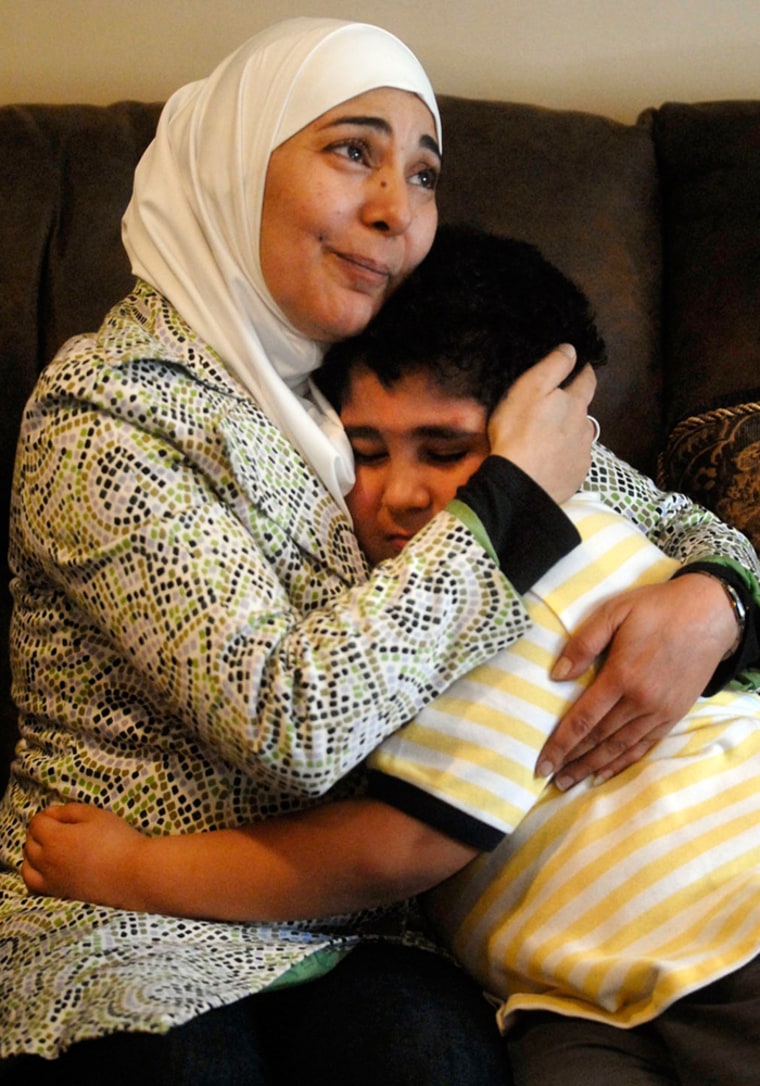Free after more than two weeks in federal immigration custody but still under a deportation order, a mother of six said Thursday she has no home other than the United States because she is a Palestinian without a home country.
Sana Alsayed, who entered the country on a tourist visa in 1993 with her husband and their then-2-year-old son, overstayed an order to leave in 2001. Now, she said she wants only for her family to be able to remain in their longtime home of Alabama.
However, they face long odds: Government records show asylum requests by Palestinians aren't common and successful efforts are rarer still.
"We are people without a country," Alsayed, 40, said in a telephone interview hours after she and her son were released. "It is tough and hard to live all your life not knowing what country you belong to."
Alsayed, husband Mohammad Mohammad and their 18-year-old son, Imad Mohammad, were arrested in their home in suburban Birmingham on Jan. 12 by agents from Immigration and Customs Enforcement, or ICE.
Mohammad was freed so he could care for their five youngest children, all U.S. citizens ages 5 to 17. But the woman and the 18-year-old remained in a federal lockup in Louisiana until Wednesday, a day after U.S. Rep. Spencer Bachus, R-Ala., intervened.
No threat
ICE spokesman Ivan Ortiz said the agency reviewed the case at Bachus' request and determined the woman and her son could be freed for humanitarian reasons since they weren't a threat to the community and weren't likely to flee.
Ortiz said the couple and their oldest son can remain in the United States until they obtain documents allowing them to move back to their home country. But the family says they have no home, and Ortiz said it was impossible to say how long they might stay.
"They are still under deportation orders and in removal proceedings," he said. The three must check in periodically with ICE agents, Ortiz said.
Ortiz declined comment on claims that the three are Palestinians without a country, and said the agency doesn't know how many such people may be living in the United States.
"There's no way of knowing that. If we knew where they were we would go apprehend them," he said.
Asylum requests by Palestinians seeking refuge in the United States are rare and hardly ever succeed, Justice Department records show.
Only 94 of the 477,244 people who sought asylum through U.S. immigration courts from 2000 through 2007 were Palestinians, according to records from the Executive Office for Immigration Review. Of those 94, only three requests were granted.
'We are peaceful people'
The couple and their oldest son lost a bid for asylum in the U.S. in 2001, but are still seeking it.
Mohammad, the father, said he was born in a Palestinian refugee camp in Lebanon, and Alsayed said she was born in Saudi Arabia after her Palestinian parents were forced to leave Gaza in the late 1960s. Their oldest son was born in Saudi Arabia.
Mohammad, who works as a handyman, said neither he, his wife, nor Imad are citizens of any country because of their status as Palestinian refugees. Lebanon and Saudi Arabia do not automatically grant citizenship to people born on their soil. The family came to the United States partly because Mohammad had a brother here.
Mohammad said the three obtained visas at the U.S. embassy in Riyadh, Saudi Arabia, using documents showing their status as Palestinian refugees. Once in the United States, he and his wife had five more children.
"I'm a taxpayer since the day I arrived. I have a Social Security number. No welfare, no food stamps, no Section 8 housing," he said. "We are peaceful people."
The ICE spokesman said the mother was freed partly because of the younger children.
"The primary concern was that there are five other minors involved who are U.S. citizens," Ortiz said.
